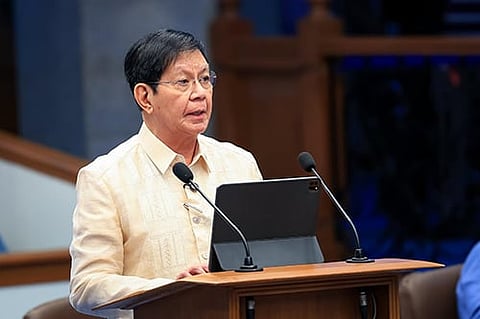
- NEWS
- the EDIT
- COMMENTARY
- BUSINESS
- LIFE
- SHOW
- ACTION
- GLOBAL GOALS
- SNAPS
- DYARYO TIRADA
- MORE

Senator Panfilo “Ping” Lacson on Wednesday raised the alarm over the staggering economic fallout from so-called ghost flood control projects, estimating losses at a whopping P118.5 billion since 2023. He warned that the greater injustice would be letting those responsible walk away without facing the consequences.
Lacson, known for his longstanding fight against corruption, was referring to Finance Secretary Ralph Recto’s revelation that the fake flood control projects have caused massive economic damage, equivalent to as many as 266,000 jobs lost.
“With the Department of Finance’s mind-boggling estimated economic loss of P118.5 billion due to ghost flood control projects, if those responsible go unpunished the government may be committing a bigger crime against the Filipino people,” Lacson posted on X (formerly Twitter).
The figures were revealed during a Development Budget Coordination Committee (DBCC) briefing on the proposed P6.793-trillion national budget for 2026.
Recto admitted that while generating government revenue is already difficult, it is even more disheartening when funds are squandered on fictitious and useless projects.
Lacson pointed out that from 2011 to 2025, the Department of Public Works and Highways (DPWH) received over P1.9 trillion in budget allocations, a significant portion of which was earmarked for flood mitigation. Yet, he said, many parts of the country continue to suffer chronic flooding.
In his privilege speech at the Senate on 20 August, Lacson exposed what he called a “corruption-riddled” system of approving and funding flood control projects that exist only on paper.
He cited reports of repeated allocations for the same locations, non-existent projects, and paper trails indicating manipulation at various levels of government.
The former PNP chief stressed that unless those involved are prosecuted, convicted, and jailed, the cycle of corruption will only persist.
“If no one is punished accordingly, this will encourage many to engage in corruption because they can get away with it,” Lacson said.
He reiterated the need for systemic reforms, including tighter scrutiny of infrastructure budgets and more rigorous implementation of audit findings by the Commission on Audit, the Department of Budget and Management, and the Office of the Ombudsman.
